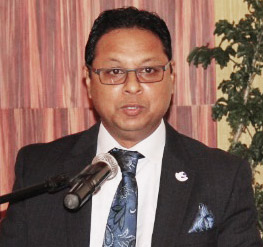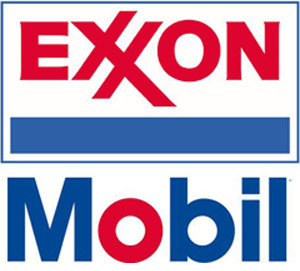needs to draw from the T&T experience

Georgetown – Chairman of the Trinidad and Tobago Transparency Institute (TTI), Dion Abdool on Saturday night urged Guyanese to learn from his country’s mistakes as this country prepares to become a major oil producer.
Addressing the Transparency Institute of Guyana Inc.’s (TIGI) annual fund-raising dinner at the Pegasus Hotel, he recommended that Guyana’s Extractive Industries Transparency Initiative (GEITI) be the independent third party through which revenues are accounted for and reconciled and the transactions verified.
“Like TTTI, the Guyana Transparency Institute sit at the EITI table, they must insist for transparency and accountability in the reporting of the revenue so that there can be no tax leakage. Learn from our lessons well in Trinidad; it will redound to your benefit,” he said.
ExxonMobil’s Senior Director, Public & Government Affairs in Georgetown, Kimberly Brasington earlier this month stated that, “Our intention is that we are disclosing them to an independent third party that is identified by the government and the government also discloses to that same independent third party the revenues that they are receiving and then the third party is supposed to reconcile in and out and make that public on annual basis,” she told reporters. The mechanism could include the GEITI which is a member of the Norway-headquartered EITI.
Abdool’s advice was provided against the background of Trinidad and Tobago’s Energy Minister identifying “tax leakage”– declining taxes and royalties – as the reason for a drop in revenue rather than merely a fall in production and the amount of hydrocarbons.
Warning Guyana against believing that they could be ripped off only by foreigners, he cited another example involving a domestic Trinidad and Tobago (T&T) company that had been recently involved in a fake oil scandal. He said an audit of the state oil company found that the country was fleeced of millions of dollars during a few months. “In just a few months, they found that the volumes recorded by and reported and based on which the extractor was being paid were wrong to the tune of many, many millions of dollars. Learn from our experiences,” he said.
The Chairman of TTTI emphasised the need for Guyana pays close attention to inflows and outflows by accounting, reconciling revenues. “I suggest that, as in Trinidad and Tobago, this is an area for Guyana and you all in this room and other civil society members to pay attention to and more so now that you are on the cusp of such great wealth,”
“This is of paramount importance and there must be an independent third party looking at the revenue coming from the corporation that is extracting the oil and from the entity – the government – that is receiving it. Somebody must do some reconciling there as a start,” he added.
The TTTI official said it is important that credible data and other types of information are available to build trust and as a vital prerequisite if government, citizens and corporations are to safeguard wealth and maximise revenue.
“Disclosure is in everyone’s best interest. The absence of information leads to mistrust. All may be well but the mere fact that the information is not available leads to mistrust in the public’s mind,” he said.
Meanwhile, Abdool announced that a Pan-Caribbean team of Transparency chapters will soon be established to advocate for good governance, transparency and legislation such as those on freedom of information, political campaign financing and whistle-blowing. Barbados, Grenada, St.Kitts and Nevis, St. Lucia and the Cayman Islands are among those that will initially be part of the regional network.
Plans are also in the pipeline to train and certify journalists to conduct investigations with the aim of furthering the cause of driving good governance and eradicating corruption
Although Guyana’s score on Transparency International has improved from 29 in 2015 to 34 in 2016 and 38 in 2017. the TIGI President, Troy Thomas cautioned against complacency as Guyana heads towards commercial oil production in 2020.
“This does not mean that all is well since being the best of the worst is not the ultimate goal. The reality is that Guyana is still among the highly corrupt countries in the world and the imminent petroleum production and the cash flow that is likely to result can threaten whatever gains have been made. We need to remain watchful and strengthen our resolve so that Guyana and Guyanese receive the benefits of our resources and not the few entrusted with the power to manage them,” he said.
Thomas noted that Guyana’s “impressive movement upwards” since the APNU+AFC coalition came to power in May 2015 was based on responses by ordinary Guyanese and experts. This amounts, in my view, to an impressive movement upwards since the coalition government won the May 2015 general elections.
“This indicates to us that the citizens that were asked to respond to certain questionnaires and the Guyanese experts that were asked to give their opinions on what’s going on in Guyana believe that encounters of corruption in the daily lives of our citizens have been on the decline. It means that we are gaining ground in the fight against corruption,” he said.
The TIGI President, however, listed several lingering concerns such as the Georgetown City Council parking meter contract without public tender, failure to place the US$18 million signature bonus with ExxonMobil into the consolidated fund, the retention of the pharmaceutical storage bond contract, breaches in health sector procurement, and exorbitant expenditure by government ministers.
against ExxonMobil

According to the UK Guardian newspaper, ExxonMobil told a Senate inquiry last Wednesday it did not expect to pay any Australian corporate tax until 2021, meaning it would not have paid the tax for eight years, and was again accused of misleading the inquiry over its links to tax havens.
The Guardian said that the oil and gas giant’s Australian tax affairs have faced close scrutiny since the release of an investigation by the Tax Justice Network (TJN) last year that exposed a complex web of hundreds of foreign subsidiaries designed for tax avoidance.
On global non-profit tax oversight body, Global Alliance for Tax Justice’s website, the organization reveals that leaked documents have revealed that Exxon has at least 575 companies incorporated in The Bahamas with names beginning with ExxonMobil, Esso, Exxon and Mobil. ExxonMobil Corporation’s US filings reveal that the multinational has US$54 billion stashed offshore and that the Australian Tax Office (ATO) has not approved Exxon’s tax filings for nearly a decade.
While Exxon has not recorded a taxable income or paid corporate tax in Australia for three years in a row, it reported revenue of $9.6bn in 2013-14, $8.5bn in 2014-15 and $6.7bn in 2015-16.
Allegations against the company are that it had received two related-party loans, one from its US parent company, and another from The Bahamas entity worth $1bn. The company said it used about 2% of the loan to partially deduct from its taxable income.
The inquiry heard the Australian Tax Office had audited ExxonMobil.
“How much tax revenue has Australia lost to the Netherlands, The Bahamas or other offshore tax and corruption havens? How much will we lose in the future unless Exxon is forced to fully disclose its corporate structure and global payments to governments?” TJN questions.
The organization alleges that ExxonMobil, like Chevron, appears to have used extensive high-interest related party loans and other tricks to artificially reduce tax payments in Australia.
However, TJN claims Exxon has been even more secretive than Chevron.
“ExxonMobil Australia Pty Ltd, the primary Australian subsidiary, has failed to disclose key elements of its corporate structure in Australia in its annual report filed with the Australian Securities & Investments Commission (ASIC) and when directly asked by the Senate Inquiry into Corporate Tax Avoidance,” the TJN reports states.
“Exxon’s primary Australian company is directly owned by a shell company in the Netherlands and the Dutch company is owned by another subsidiary in The Bahamas. In effect, Exxon’s entire Australian operations are owned through The Bahamas. This appears to be a Caribbean variation of the aggressive tax-minimization,” it adds.
It was the TJN investigation that prompted a fresh hearing of the Australian Senate’s corporate tax inquiry and the Guardian said that unions slammed the company as being a “very, very bad corporate citizen”.
But in the face of TJN’s accusations that it used related-party loans between its internal subsidiaries to reduce taxable profits in Australia, Exxon fired back strongly calling the claims “baseless”.
The Guardian says that Tax Justice Network’s Jason Ward, led the investigation and he said that Exxon must be punished for the deception.
He said their actions and statements show “complete disrespect” for the committee and the Australian people, and mirrored ExxonMobil’s global track record of “arrogance and disrespect”.
“Exxon did mislead this committee in 2015, and there should be consequences,” Ward told the inquiry on Wednesday. “Why is Exxon continuing to hide the facts?”
After the TJN’s report, ExxonMobil used a submission to the inquiry to accuse Ward of defamation. ExxonMobil has sued outspoken individuals who have criticized it in the United States, the inquiry has heard, according to the Guardian.
The company’s actions saw Australian Labour senator Doug Cameron assert that it was the first time in 10 years he had seen such a threat, and said he would be “very concerned” if the multinational was trying to intimidate a witness.
The Guardian said that ExxonMobil said it had paid $440m a year for the past 14 years through the Petroleum Resource Rent Tax (PRRT).
“But even the PRRT, a royalty scheme, was not achieving fair or adequate returns from companies extracting Australia’s natural resources, the inquiry heard. Both BHP and ExxonMobil operate a joint venture in the Bass Strait, but ExxonMobil had paid far less in PRRT. The inquiry heard a lack of transparency with the royalty scheme made it difficult to understand why there was such a divergence,” the Guardian said.
ExxonMobil’s chairman in Australia, Richard Owen, flatly denied any attempt to mislead the inquiry.
“The accusation by the Tax Justice Network was that we misled this community,” Owen said. “And I clearly say that we have not misled this community. That we have answered truthfully all the questions that have been put to us. And therefore we find the accusation very disappointing.”
ExxonMobil released new data on its financial affairs and structure to counter what it described as “misinformation” and “innuendo”.
Owen said ExxonMobil had “decades and decades” of paying tax in Australia, including more than $2bn since 2000, averaging $200m a year.
“In the 1970s and the 1980s, the company was providing 14% of all government tax receipts, the inquiry heard. ExxonMobil said it was now in a unique position due primarily to the cost of $21bn in capital investment in Australia over the past decade, including in its operations in the Bass Strait and Western Australia. Lower prices were driving down income, the company said, and there was a high cost associated with the debt it had taken on to fund its investment,” the newspaper reported.
“We are in a unique period, and expect it to be short-term in our corporate history, with no income tax paid since 2013,” the Guardian quotes Owen as saying. “And that’s due to the recovery of invested capital, lower prices that are driving down income, and the cost of debt to fund the significant amount of investment … that we’ve made,” he added.


